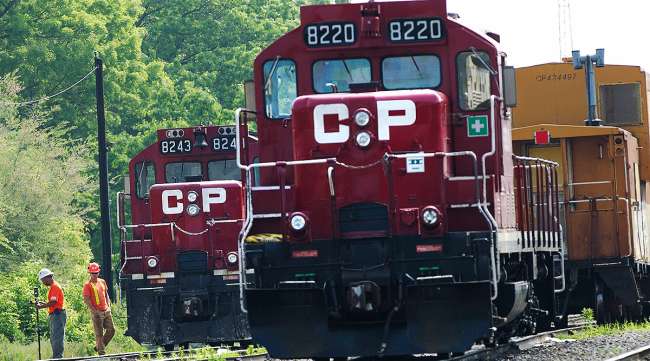Senior Reporter
Kansas City Southern Picks Canadian Pacific Bid

[Stay on top of transportation news: Get TTNews in your inbox.]
Just hours before the expiration of a Sept. 12 deadline, Kansas City Southern accepted a $31 billion merger proposal from Canadian Pacific Railway.
If approved, the new railroad would for the first time link Canada, the United States and Mexico.
The decision by KCS comes after six months of back-and-forth negotiations with CP and rival Canadian National Railway, who made a financially superior bid.
But the CN proposal on Aug. 31 ran headlong into regulatory and antitrust concerns after a key portion of the merger agreement, called a voting trust, was rejected on a 5-0 vote by the U.S. Surface Transportation Board. That revived the CP bid, offering investors $300 a share.
The voting trust would have allowed KCS shareholders to be paid in advance and allow the independent voting trust to operate KCS while regulators reviewed the transaction.
The KCS board of directors said it determined CP’s proposal constitutes a “Company Superior Proposal” as defined in the KCS merger agreement with CN.

Creel
“We are pleased to reach this important milestone and again pursue this once-in-a-lifetime partnership,” Keith Creel, CEO at CP, said in a statement. “As we have said throughout this process, CP remains committed to everything this opportunity presents. This merger proposal provides KCS stockholders greater regulatory and value certainty. We are excited to move forward as we work toward making this perfect match a reality.”
KCS is attractive because while it is the smallest of the Class I railroads, it is the only one that operates deep into Mexico with links to rail lines in Texas and the upper Midwest. The new United States-Mexico-Canada trade agreement is designed to increase cross-border trade and manufacturing among the three nations. About $2.6 billion of KCS’ annual revenue is attributable to its Mexico operations.
CN now has five days to increase its offer of $33.6 billion, or $325 a share, but transportation analysts who have followed the battle for KCS doubt that will happen because of the STB’s resounding rejection of the voting trust and concerns the government agency has raised about the proposal being potentially anti-competitive.
The STB has also signaled that the only Class I railroad combination likely to gain approval is between CP and KCS.
“I’m not surprised that KCS has accepted this proposal,” Paul Bingham, a transportation economist with IHS Markit, told Transport Topics. “The signals from the STB were pretty clear. So what recourse does CN have then, trying to come up with an explanation to the STB that will be less anti-competitive?”
“Now that the board of the KCS has said it’s going with CP it certainly makes it a lot tougher for CN to counter it again and get KCS to switch again,” Bingham said. “It’s not a matter of saying coming back with another billion. At some point it becomes pointless if you can’t get it past the STB.”
Going forward, CP and KCS said they plan to present their merger proposal to the STB in October. The merger could gain STB approval in about a year.
CP offer for KCS declared “Company Superior Proposal” by KCS Board; CP looks forward to executing definitive merger agreement with KCS.
See important information here: https://t.co/10sFyZKsoH pic.twitter.com/jUu1wuroL9 — Canadian Pacific (@CanadianPacific) September 12, 2021
The CP-KCS merger proposal has now gone full circle.
In March, CP offered more than $28 billion, including assuming nearly $4 billion in KCS debt, which appeared to be well on its way to approval. But weeks later, CN proposed a $33.6 billion merger and the KCS board reversed course and said it would join forces with CN. However, CP insisted a merger between CN-KCS would never pass regulatory approval. Weeks before the STB vote, CP upped its offer to $31 billion.
Then, in July, the Biden administration issued an executive order indicating that in the aftermath of the COVID-19 pandemic it would seek more competition in the economy, including the major freight railroads.
For its part, CP leadership had long maintained that its offer — which had been trumped by CN’s richer offer — had a far stronger chance of winning regulatory approval.
Bingham said while the proposed CP-KCS merger is in a strong position, he’s not convinced it’s a done deal yet with the regulators.
“It’s not automatic until the STB approves it,” he said. “There may still be some hurdles thrown in front of this deal.”
Meanwhile, on Sept. 7, one of CN’s leading shareholders announced plans for a proxy fight to replace five members of the current board of directors with members who will fire CN CEO JJ Ruest. London-based TCI Fund Management Ltd., which owns a 5% stake in CN and is run by investor Chris Hohn, said CN’s pursuit of KCS exposed a basic misunderstanding by CN’s board of the railroad industry and the government’s regulatory environment.
Want more news? Listen to today's daily briefing below or go here for more info:



